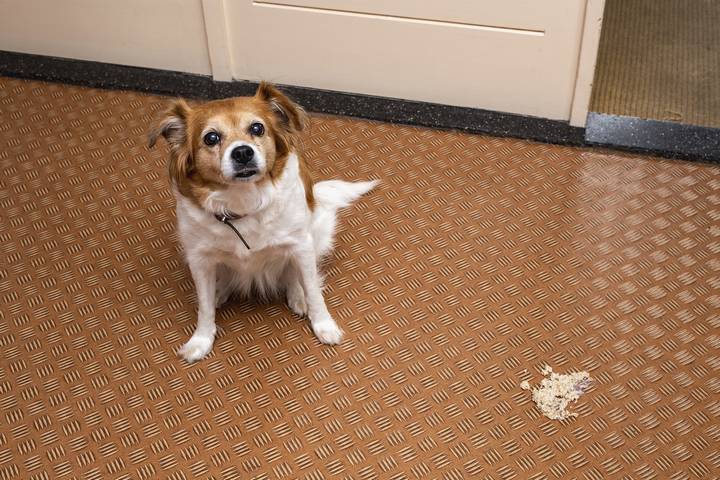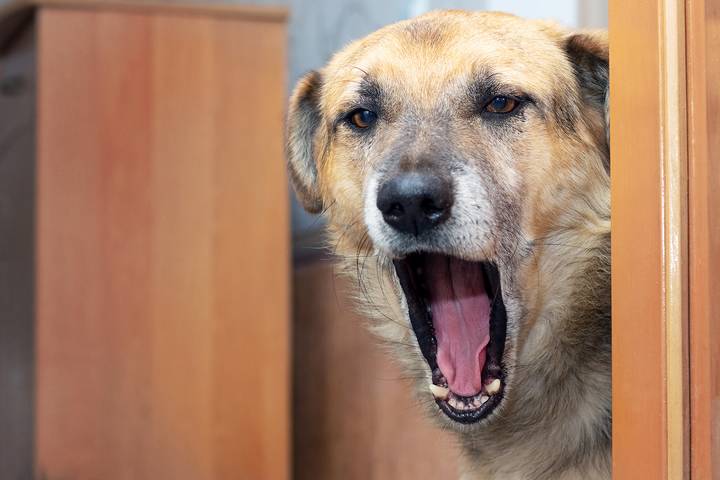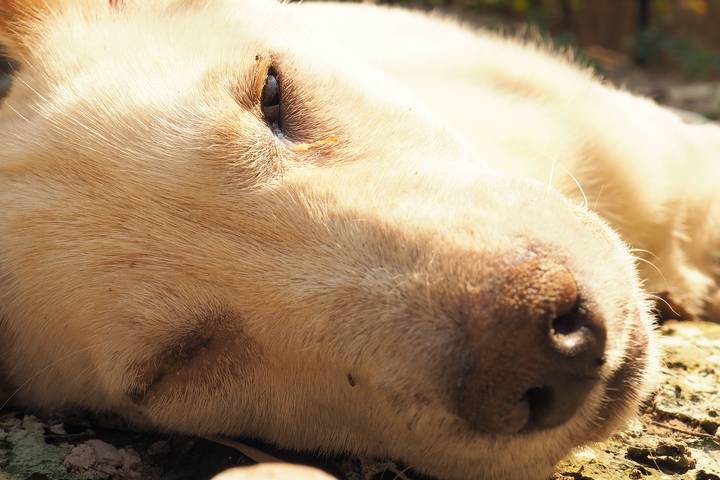Most dogs love to eat. But unfortunately, some foods that are delicious for us humans are toxic for dogs. This is the case for grapes, chocolate, avocado, onions, macadamia nuts, and alcohol.
And sometimes, dogs can get too curious and get poisoned by eating medication, potpourri, glue, paint, rat poison, antifreeze, and other bad things.
But how can you tell if your dog ate something he was not supposed to eat? You need to be aware of these nine signs a dog has been poisoned and to act quickly if you notice some of them.
Sign #1: Your dog vomits or has diarrhea

Vomiting is often the first sign that shows a dog has been poisoned. Depending on what your dog has ingested, some blood could be in his vomit.
Diarrhea, with or without blood, can be another sign of poisoning. As soon as you notice there seems to be an issue with your dog’s gastrointestinal system, try to find out if he could have eaten something toxic.
Sign #2: Your dog keeps coughing or retching

Is your dog suddenly coughing or retching? It could be due to an illness such as kennel cough or canine influenza or caused by chronic bronchitis, allergies, or heartworms.
But coughing and retching can also indicate that a dog has ingested rat poison. Some types of rat poison prevent blood from clotting and can cause a dog to bleed into his chest cavity. If you or a neighbour has been using rat poison recently and you notice your dog coughing, take him to the vet urgent care immediately.
Sign #3: Your dog is drooling or foaming at the mouth

His mouth irritates when a dog eats something toxic or chews on it. This often leads to excessive drooling.
If your dog appears to be drooling more than usual or is foaming at the mouth, try to figure out if he might have been chewing on something other than his toys or treats.
Sign #4: Your dog has difficulty breathing

Different toxins which affect dogs will cause symptoms linked to their respiratory system. If your dog is panting, wheezing, or breathing very slowly, it could be because he got poisoned after eating something he wasn’t supposed to.
Trouble breathing could also indicate that something got stuck in his throat, so seeing a veterinarian is a good idea so your dog can get the help he needs.
Sign #5: Your dog’s skin or gums look abnormal

Does your dog’s skin look abnormal? If you notice burns or sores on his skin, exposure to harmful chemicals could have been caused. Different plants and flowers are also toxic for dogs and can irritate their skin. This includes ivy and the philodendron.
Some toxins will make your dog’s gums, tongue, and eyelids pale. Others will make them turn blue or even yellow.
You should also pay attention to your dog’s body temperature. If he seems too hot or cold to the touch, this could be another sign of poisoning.
Sign #6: Your dog is tired and lethargic

It’s normal for your dog to feel tired after playing and running around all day. But you should be concerned if your dog is tired despite not exercising much during the day.
When a dog is poisoned, he can become lethargic for different reasons. Xylitol, for example, is an artificial sweetener that is toxic for dogs. It causes low blood sugar and makes it difficult for your dog to feel energetic.
Sign #7: You notice a sudden behaviour change

A sudden behaviour change is often a sign a dog has been poisoned. Dogs who ingest alcohol or antifreeze might look depressed or act like they are drunk.
On the other hand, a dog who eats chocolate or medication meant for humans can become excited or even hyperactive. If your dog’s behaviour seems unusual, you might want to consider a trip to the veterinary clinic.
Sign #8: Your dog has muscle spasms

Seizures are never a good sign. If your dog has seizures, muscle spasms or tremors, it could be because he has eaten something toxic that affects his nervous system or muscles.
You should contact a veterinarian as quickly as possible to ensure the situation will not worsen. Keep in mind that some toxins act very quickly and can cause death.
Sign #9: Your dog loses consciousness

Some toxins act so quickly that you might not realize something is wrong with your dog until he loses consciousness.
If your dog suddenly collapses, this is an emergency, and you need to get him to a veterinary clinic urgently.
